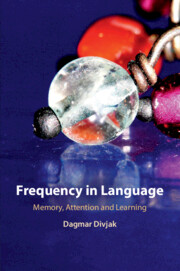Book contents
- Frequency in Language
- Frequency in Language
- Copyright page
- Dedication
- Contents
- Figures
- Table
- Acknowledgements
- Introduction
- Part I
- Part II
- Part III
- Part IV
- 8 Predicting: Using Past Experience to Guide Future Action
- 9 Learning: Navigating Frequency, Recency, Context and Contingency
- 10 By Way of Conclusion
- References
- Index
9 - Learning: Navigating Frequency, Recency, Context and Contingency
from Part IV
Published online by Cambridge University Press: 26 September 2019
- Frequency in Language
- Frequency in Language
- Copyright page
- Dedication
- Contents
- Figures
- Table
- Acknowledgements
- Introduction
- Part I
- Part II
- Part III
- Part IV
- 8 Predicting: Using Past Experience to Guide Future Action
- 9 Learning: Navigating Frequency, Recency, Context and Contingency
- 10 By Way of Conclusion
- References
- Index
Summary
We started out the previous chapter by asking how frequency of experience, memory and attention link together. It has long been known that ‘experience is the stuff of which all learning is made’ (Monsell 1991: 149), and linguists have been keen to collect frequencies of occurrence that provide a rough estimate of the differential amount of linguistic experience an average adult will have had. But the ubiquity of frequency effects does not imply that frequencies should be considered explanations or answers in their own right. Predictability-based approaches to language are one answer to this question, and in Chapter 8 we reviewed work relying on Bayesian belief updating.
Information
- Type
- Chapter
- Information
- Frequency in LanguageMemory, Attention and Learning, pp. 233 - 259Publisher: Cambridge University PressPrint publication year: 2019
